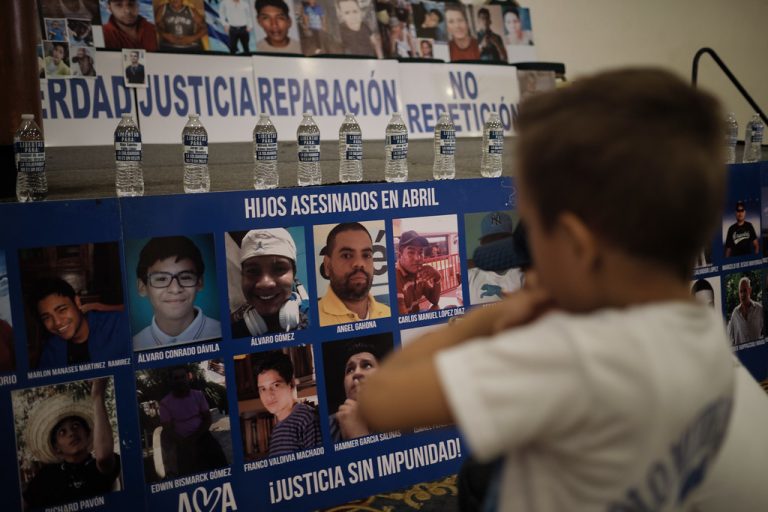26 de diciembre 2019

Ortega Grants Chinese Company a Huge Mining Concession

PUBLICIDAD 1M
PUBLICIDAD 4D
PUBLICIDAD 5D
Dictatorship of Daniel Ortega prevents peaceful assembly, freedom of expression, and professing one’s religion, confirms UN OHCHR’s bi-monthly report

Dictatorship of Daniel Ortega prevents peaceful assembly
The Office of the United Nations High Commission for Human Rights (OHCHR), reported in its monthly bulletin number 13 on the situation of Nicaragua, which covers the period of October and November, the “intensification of violations of the rights of peaceful assembly and freedom of expression, as well as acts of harassment and selective persecution against dissenting voices.”
The worldwide human rights defense entity, continues to monitor the situation in the country, an effort made from inside and outside Nicaragua, especially after Daniel Ortega’s regime expelled them from the country, as it also did with other entities such as the Inter-American Commission on Human Rights (IACHR) or the Special Follow-Up Mechanism for Nicaragua (MESENI).
“People previously arrested in the context of the protests, relatives of incarcerated or deceased political opponents, Catholic priests, journalists, community leaders and human rights defenders, suffered attacks against their lives or personal integrity, arbitrary detentions and different types of threats and intimidations, both by police officers and pro-government elements,” says the report.
The phrase “pro-governmental elements,” is a technicality (but also a more precise way) of referring to what colloquially are known as “paramilitaries,” which others call “para-police.”
Among the main victims of the selective process of recapturing former prisoners, are mentioned Amaya Coppens and Olga Valle, members of a group of citizens who now call themselves the “group of the water carriers,” captured after delivering water and some household goods to the temple of San Miguel, in Masaya, in whose interior a hunger strike had begun in previous days to demand the release of political prisoners kidnapped by the regime.
The bulletin includes a photograph of Coppens and Valle, taken 10 weeks earlier, in Geneva, (Switzerland), to where they traveled on the occasion of the 42nd session of the Human Rights Council. Their reincarceration served to demonstrate the veracity of the complaints.
The detention of Amaya “could be considered as an act of reprisal for having denounced the human rights situation in Nicaragua and for having made contact with officials and instruments of the United Nations, said the spokesperson of OHCHR, at a press conference.
The report uses four of its nine pages to illustrate what it calls “Violations of the right of peaceful assembly, freedom of expression and the freedom to profess one’s religion,” the latter section being the one that occupies most of its interest.
“The National Police continued to restrict fundamental freedoms through the systematic prohibition of demonstrations and the deployment of a large number of police officers in public places, which prevented people from protesting for fear of being arrested,” the document said.
“The Police also limited the right to freedom of expression during religious acts, in which people held improvised protests,” an action which it labeled “apparently disproportioned to protect public safety,” in reference to the deployment of dozens of police outside Catholic temples.
“Occasionally, pro-government elements, who seemed to act with the acquiescence and tolerance of the National Police, physically attacked and threatened protestors, Catholic priests and other parishioners at the entrance of or within churches, violating the right to profess one’s religion,” it adds.
Among others, the bulletin mentions the assault against people who participated in the procession of the “Virgen del Rosario” in Esteli, on October 7: as well as the besiegement of citizens who, on October 18, tried to deliver staple products for political prisoners in Managua, Estelí, Matagalpa, Masaya, Chinandega and Leon, among others.
They also report how the temple of San Miguel in Masaya was cordoned “by the police and pro-governmental elements. The authorities cut the water and electricity and prevented anyone from entering the church and delivering humanitarian supplies, including water and insulin for the priest with diabetes,” until they were evacuated on November 22.
The attack and invasion of the Managua Cathedral, where another group began a short-lived hunger strike, which a mob of the regime’s followers attacked with violence on November 18, until they were also rescued (“evacuated” the document says) by the Nicaraguan Red Cross.
The bulletin denounces “the intensification of harassment and intimidation” against the members of the Mothers of April Association, especially after the inauguration of the Museum of Memory in Managua, as well as the affront to the Reyes Alonso family, last November 25, when “the Police Commissioner of Leon (Fidel Dominguez), along with police agents and hooded men in civilian clothes,” humiliated them in their own home.
The UN human rights office “continued to receive reports of arbitrary detentions, surveillance and, in some cases, harassment of people considered to be opposed to the Government, including journalists, relatives of deceased people in the context of protests and former prisoners,” states the report.
“President Ortega, Vice President Murillo and their son, Juan Carlos Ortega, publicly describe those who disagree with the Government as “traitors, enemies of the people and hustlers,” it sums up.
“In accordance with international human rights norms and standards, any national, racial or religious hatred will be prohibited. It is particularly important that the authorities refrain from using inflammatory expressions, since they can incite members of the population to use discriminatory, hostile or violent language and/or to act violently,” said OHCHR.
Archivado como:
PUBLICIDAD 3M
Periodista nicaragüense, exiliado en Costa Rica. Durante más de veinte años se ha desempeñado en CONFIDENCIAL como periodista de Economía. Antes trabajó en el semanario La Crónica, el diario La Prensa y El Nuevo Diario. Además, ha publicado en el Diario de Hoy, de El Salvador. Ha ganado en dos ocasiones el Premio a la Excelencia en Periodismo Pedro Joaquín Chamorro Cardenal, en Nicaragua.
PUBLICIDAD 3D